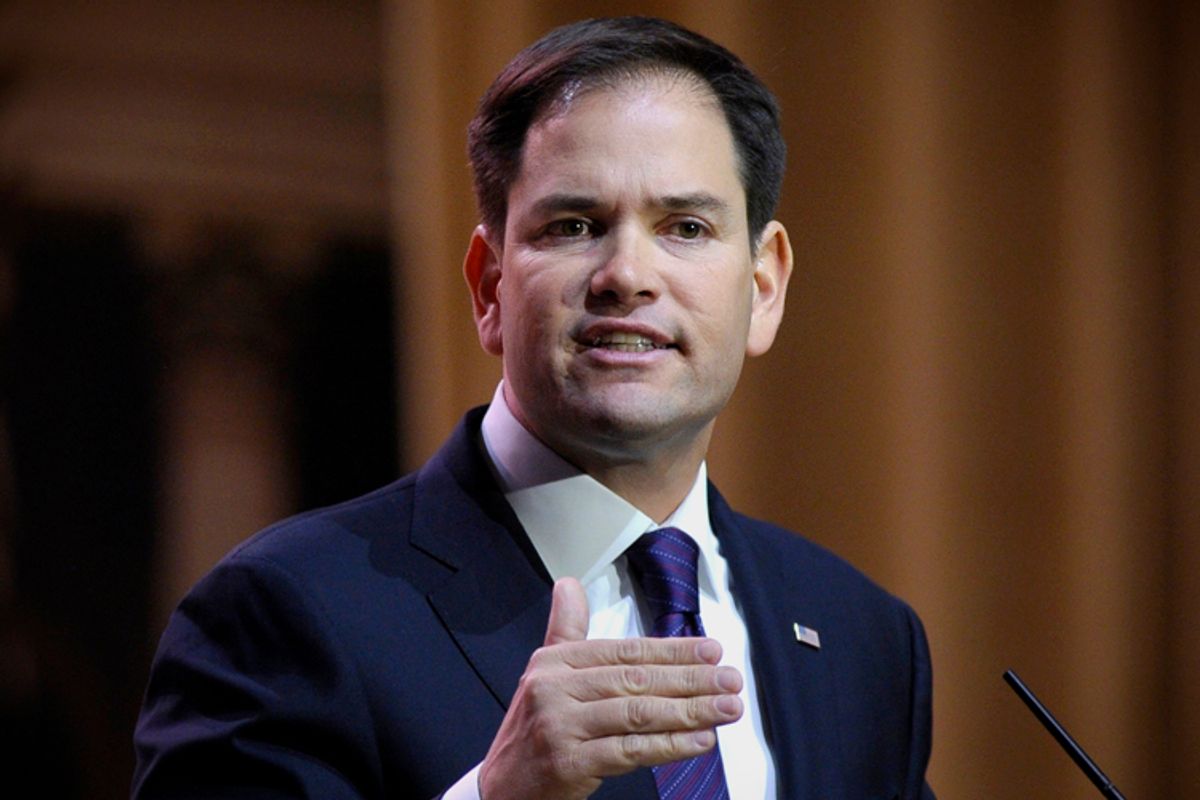Marco Rubio is back! To learn how he returned, you need to know where he went in the first place. Rubio arrived in the Senate as essentially a blank slate. He was Hispanic, which helped to quickly place him in the top tier of 2016 candidates among lazy pundits. Conservatives thought him conservative enough to get through a GOP primary campaign, but not too conservative to scare the norms. Then, he made a fatal error: He constructively involved himself in the legislative process.
Rubio was a member of the Senate's "gang of eight" committed to developing a comprehensive immigration reform package. Senior Republicans were on board because corporations like cheap labor and open borders, and also because America is getting less white and the Republican Party would like to continue winning elections in the future. Right-wingers were opposed, because America is getting less white and they would like to make that not be the case through the power of tantrums or, failing that, the widespread suppression of suffrage and restriction of citizenship. Rubio sided with the senior Republicans. That basically destroyed his conservative cred in an instant. He plummeted in polls of Republican voters. He spent most of the rest of 2013 pathetically trying to win conservatives back. Nothing seemed to help.
Now, though, BuzzFeed's McKay Coppins can proudly announce the official commencement of the Marco Rubio Comeback Narrative. It all happened because of one little speech -- one he didn't even plan to give -- that rocketed around the world (or at least got a Drudge link). For 14 minutes, Rubio delivered impassioned, off-the-cuff remarks on the subject of how Cuba's government is bad. He said America should oppose Cuba's government, because it is bad.
Then something magical happened:
Watching the remarks from their office, Rubio’s team was taken aback. “We were a little surprised because we were expecting a speech on Venezuela, but it ended up being much bigger than that,” said one aide. They scrambled to post the C-SPAN clip to YouTube and transcribe the remarks.
With the help of a well-placed Drudge link, the speech quickly went viral on the right, drawing upwards of 300,000 YouTube views so far, and becoming a talk radio sensation.
Boom. Talk radio sensation. Rubio did it.
Look, I am sure that Rubio's staff would very much like for there to be a major grass-roots Rubio comeback that happens to coincide nicely with CPAC. Is there one? I don't know. I haven't seen any polls. 2016 is still a ways away. Maybe people saying nice things about Marco Rubio actually just means that no one sees him as a threat. Once it is in various people's political interests to remind everyone that Rubio supported "amnesty," they will get to it. For now, who cares about him?
Eventually, we learn that Rubio's senior staff, which is currently working to create the narrative of a Rubio comeback, is prepared for the backlash:
Meanwhile, as Rubio once again enjoys 2016 hype, his senior staff remains clear-eyed about how media narratives can work. One aide said he expected the backlash to the Rubio comeback story to materialize within weeks.
More like "a few hours." Jason Linkins soon tore into the piece and its premise that a Drudge link translates to renewed 2016 hopes. TPM's Tom Kludt followed up. Of course, the backlash Rubio's staff said they were girding themselves for would be one from the conservative media sphere, but what I'm guessing has them more worried is the prospect that the conservative media sphere will just ignore their branding campaign.
It is probably intentional that the subject of the speech that Rubio's staff decided to use to build its case for his comeback was Cuba (and Venezuela). Rubio's thing these days is not so much immigration, or domestic policy in general, but rather being the new king of Tough, Muscular Foreign Policy.
Now, Tough, Muscular Foreign Policy is not exactly lacking for advocates in the Republican Party. I'm not clear how this is supposed to help Rubio differentiate himself from any potential rivals besides Rand Paul. Mitt Romney, too, developed a serious case of Tough, Muscular Foreign Policy just before the 2012 elections. John McCain has been Tough and Muscular for decades. And, come on, we're supposed to be impressed with Rubio taking a stand on Cuba? As a Republican of Cuban descent from Florida, speaking in opposition to normalizing relations with Cuba is just about the single least interesting or notable thing Marco Rubio could possibly do. It is like Chris Christie coming out in favor of "common-sense solutions." It's baked into his political identity.
Rubio has always espoused a Bill Kristol-approved defense policy, but it's clear that he's decided to be the loudest standard-bearer for hawkish, neoconservative-inflected foreign policy in the conversation. Take a look at his handy list of things "Obama must do" about Ukraine, which includes expanding NATO to Georgia and also stating "unequivocally" that Putin is a mean jerk. (When Tough, Muscular Foreign Policy types think calling for actual war won't be received well, they usually fall back on demanding that the president say Tough things unequivocally.) Now he's at CPAC, telling people that North Korea will nuke California as Iran is nuking New York as we wage a global struggle against China and Russia and "totalitarianism." Sounds like fun!
If this is what the Marco Rubio comeback is going to look like, I'm not convinced it's a wise strategy. Republicans may be obsessed with the image of our "weak" president "folding" before "tough" Vladimir Putin, but Americans in general are not hugely interested in picking fights with other countries at the moment. There will always be room in the Republican Party for men who like to repeatedly state their own toughness with respect to dealing with other countries, but these days it's much more popular among conservatives for Republican politicians to be tough on people closer to home. You know, like food stamp recipients.

Shares